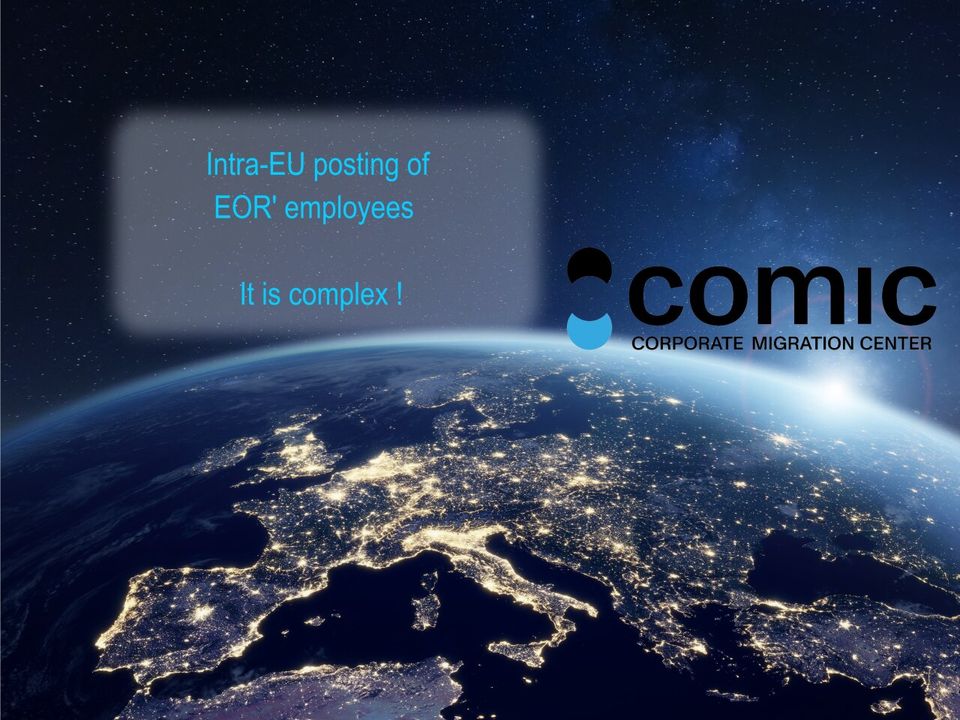Intra-EU posting of EOR’ employees – a foreseeable scenario?

Employment of record characterizes usually as a tripartite employment relationship:
A - factual employer – the company that exercises authority over the employee,
B - EOR – “formal employer” – hosting the employment relationship,
C - Employee.
In most of the EOR scenarios, the factual employer is established out of the EU.
It is settled case law (European Court of Justice and Member States’ national jurisprudence) that the party with whom the worker has formally concluded a contract of employment needs not be the employer (Opinion of Advocate General Pikamae of 26 November 2019, AFMB Ltd and Others, C- 610/18, EU:C:2019:1010, paragraph 47).
The determination of the existence of an employment relationship should be guided by the facts relating to the actual performance of the work and not by the parties’ description of the relationship (Preamble 8 of Directive 2019/1152/EU on transparent and predictable working conditions in the European Union).
The factual employer is the company which has actual authority over the employee, which bears, in reality, the costs of paying his or her wages, and which has the actual power to dismiss him or her (Judgment of 16 July 2020 AFMB Ltd and Others, C-610/18, EU:C:2020:565, paragraph 80).
The question is whether an employee having concluded a contract of employment with an EOR (formal employer) in one of the EU Member States, may be posted to the territory of another Member State in the meaning of
A - Directive 96/71/EC as amended by Directive 2018/957/EU and
B - article 12 Regulation 883/2004
In the same context, what about multi state activity in the meaning of Article 13 Regulation 883/2004?
Labour law – Directive 96/71/EC
From the perspective of labour law, regardless of the posting scenario, the undertaking deemed to make the posting is the employer (see inter alia ECJ Judgment of 14 November 2018, Danieli & C. Officine Meccaniche and Others, C-18/17, EU:C:2018:904).
Pursuant to Article 1.3 Directive 96/71/EC as amended, an employment relationship must exist between the undertaking making the posting (or temporary employment undertaking) and the worker, during the period of posting.
Having regard to the above considerations and case-law cited, an employment relationship is deemed to exist between the factual employer and the employee (regardless of the employment contract concluded with the EOR).
It follows that the undertaking making the posting is the factual employer.
Provided that the employee is a non-EU national, the factual employer being established outside the EU shall not invoke the Vander Elst principle giving rise to an exemption from the obligation to hold a work permit in the host Member State.
In simple words, even if the non-EU national holds a work and residence permit/single permit, (authorisation of employment issued to the EOR in the capacity of employer, and not on behalf of the employer), valid in the EU country in which the EOR is established, she/he is not posted by the EOR (formal employer) to another EU Member State, but by the factual employer. The factual employer provides the service, and undertakings established in a non-member State do not benefit from the freedom to provide services in the EU.
As regards the remuneration due in the host Member State, where relevant, minimum wage thresholds applicable to third-country nationals prevail to base remuneration due in accordance with applicable collective bargaining agreements (provided that the former are higher). Mandatory supplements are due in accordance with the applicable collective agreement.
The Danieli case (see Article 1.3c second paragraph Directive 96/71/EC as amended) is irrelevant in such scenarios: it cannot be alleged that the employee is posted by the factual employer to the territory of the host Member State, by means of hiring out the employee to the EOR established in one Member State, and operating in the host Member State, merely because the EOR is factually not involved in the provision of services.
The scenario falls under the scope of Article 1.4 Directive 96/71/EC (undertakings established in a non-member State).
Is that reasoning valid in any circumstances? The answer is in the negative.
Practically, from the perspective of labour law, the employee is employed by the factual employer (established outside of the EU) and is working in the country in which the EOR is established.
Provided that i) the authorisation of employment is obtained by the EOR on behalf of the factual employer (national practice in different Member States must be addressed; Member States may not allow this scenario), or, ii) the third-country national employed by the EOR on behalf of the factual employer benefits from unlimited access to the labour market in the Member State in which the EOR is established, the Vander Elst principle is applicable (without prejudice to the verification whether the criteria under Article 4 Directive 2014/67/EU are met).
In such cases, the employee is posted by the “place of business” established by the factual employer in the territory of the Member State in which the EOR is established, and the employee is authorised to stay and work in the latter Member State in relation to that place of business, or benefits from unlimited access to the labour market in that Member State.
Regardless of the employee’s nationality, the posting must be notified by the factual employer (or on behalf of the latter), if national law allows this.
Our next articles will address the same topic from the perspective of the social security coordination regulations.
Tanel Feldman, Immigration Law Associates – Belgium

